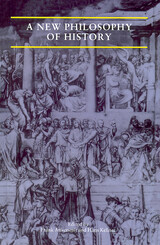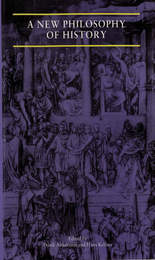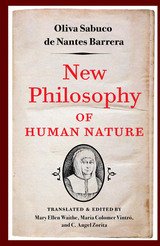5 books about New Philosophy

A New Philosophy of History
Edited by Frank Ankersmit and Hans Kellner
University of Chicago Press, 1995
What is history? From Thucydides to Toynbee historians and nonhistorians alike have wondered how to answer this question. A New Philosophy of History reflects on developments over the last two decades in historical writing, not least the renewed interest in the status of narrative itself and the presence of the authorial "voice." Subjects include the problems of Grand Narrative, multiple voices and the personal presence of the historian in his text, the ambitions of the French Annales school and the so-called "Grand Chronicler," and the relevance of non-literary models—museum presentations and picturings—regarding historical discourse.
The range of approaches found in A New Philosophy of History ensures that this book will establish itself as required reading not only for historians, but for everyone interested in literary theory, philosophy, or cultural studies.
This volume presents essays by Hans Kellner, Nancy F. Partner, Richard T. Vann, Arthur C. Danto, Linda Orr, Philippe Carrard, Ann Rigney, Allan Megill, Robert Berkhofer, Stephen Bann, and Frank Ankersmit.
The range of approaches found in A New Philosophy of History ensures that this book will establish itself as required reading not only for historians, but for everyone interested in literary theory, philosophy, or cultural studies.
This volume presents essays by Hans Kellner, Nancy F. Partner, Richard T. Vann, Arthur C. Danto, Linda Orr, Philippe Carrard, Ann Rigney, Allan Megill, Robert Berkhofer, Stephen Bann, and Frank Ankersmit.
[more]

A New Philosophy of History
Edited by Frank Ankersmit and Hans Kellner
Reaktion Books, 1995
What is history? From Thucydides to Toynbee historians and nonhistorians alike have wondered how to answer this question. A New Philosophy of History reflects on developments over the last two decades in historical writing, not least the renewed interest in the status of narrative itself and the presence of the authorial "voice." Subjects include the problems of Grand Narrative, multiple voices and the personal presence of the historian in his text, the ambitions of the French Annales school and the so-called "Grand Chronicler," and the relevance of non-literary models—museum presentations and picturings—regarding historical discourse.
The range of approaches found in A New Philosophy of History ensures that this book will establish itself as required reading not only for historians, but for everyone interested in literary theory, philosophy, or cultural studies.
This volume presents essays by Hans Kellner, Nancy F. Partner, Richard T. Vann, Arthur C. Danto, Linda Orr, Philippe Carrard, Ann Rigney, Allan Megill, Robert Berkhofer, Stephen Bann, and Frank Ankersmit.
The range of approaches found in A New Philosophy of History ensures that this book will establish itself as required reading not only for historians, but for everyone interested in literary theory, philosophy, or cultural studies.
This volume presents essays by Hans Kellner, Nancy F. Partner, Richard T. Vann, Arthur C. Danto, Linda Orr, Philippe Carrard, Ann Rigney, Allan Megill, Robert Berkhofer, Stephen Bann, and Frank Ankersmit.
[more]

New Philosophy of Human Nature
Neither Known to Nor Attained by the Great Ancient Philosophers, Which Will Improve Human Life and Helath
Oliva Sabuco de Nantes Barrera
University of Illinois Press, 2006
This volume is a critical edition of the 1587 treatise by Oliva Sabuco, New Philosophy of Human Nature, written during the Spanish Inquisition. Puzzled by medicine’s abject failure to find a cure for the plague, Sabuco developed a new theory of human nature as the foundation for her remarkably modern holistic philosophy of medicine.
Fifty years before Descartes, Sabuco posited a dualism that accounted for mind/body interaction. She was first among the moderns to argue that the brain--not the heart--controls the body. Her account also anticipates the role of cerebrospinal fluid, the relationship between mental and physical health, and the absorption of nutrients through digestion. This extensively annotated translation features an ample introduction demonstrating the work’s importance to the history of science, philosophy of medicine, and women’s studies.
Fifty years before Descartes, Sabuco posited a dualism that accounted for mind/body interaction. She was first among the moderns to argue that the brain--not the heart--controls the body. Her account also anticipates the role of cerebrospinal fluid, the relationship between mental and physical health, and the absorption of nutrients through digestion. This extensively annotated translation features an ample introduction demonstrating the work’s importance to the history of science, philosophy of medicine, and women’s studies.
[more]

Perception, Theory, and Commitment
The New Philosophy of Science
Harold I. Brown
University of Chicago Press, 1979
With originality and clarity, Harold Brown outlines first the logical
empiricist tradition and then the more historical and process-oriented
approach he calls the “new philosophy of science.” Examining the two
together, he describes the very transition between them as an example
of the kind of change in historical tradition with which the new
philosophy of science concerns itself.
“I would recommend it to every historian of science and to every
philosopher of science. . . . I found it clear, readable, accurate,
cogent, insightful, perceptive, judicious, and full of original
ideas.”
—Maurice A. Finocchiaro, Isis
“The best and most original aspect of the book is its overall
conception.”
—Thomas S. Kuhn
Harold I. Brown is professor of philosophy at Northern Illinois
University.
empiricist tradition and then the more historical and process-oriented
approach he calls the “new philosophy of science.” Examining the two
together, he describes the very transition between them as an example
of the kind of change in historical tradition with which the new
philosophy of science concerns itself.
“I would recommend it to every historian of science and to every
philosopher of science. . . . I found it clear, readable, accurate,
cogent, insightful, perceptive, judicious, and full of original
ideas.”
—Maurice A. Finocchiaro, Isis
“The best and most original aspect of the book is its overall
conception.”
—Thomas S. Kuhn
Harold I. Brown is professor of philosophy at Northern Illinois
University.
[more]

Toward a New Philosophy of Biology
Observations of an Evolutionist
Ernst Mayr
Harvard University Press, 1988
A collection of twenty-eight essays, five previously unpublished, grouped into nine categories: Philosophy, Natural Selection, Adaptation, Darwin, Diversity, Species, Speciation, Macroevolution, and Historical Perspective. The book, Ernst Mayr notes in the Foreword, is an attempt “to strengthen the bridge between biology and philosophy, and point to the new direction in which a new philosophy of biology will move.”
[more]
READERS
Browse our collection.
PUBLISHERS
See BiblioVault's publisher services.
STUDENT SERVICES
Files for college accessibility offices.
UChicago Accessibility Resources
home | accessibility | search | about | contact us
BiblioVault ® 2001 - 2024
The University of Chicago Press









